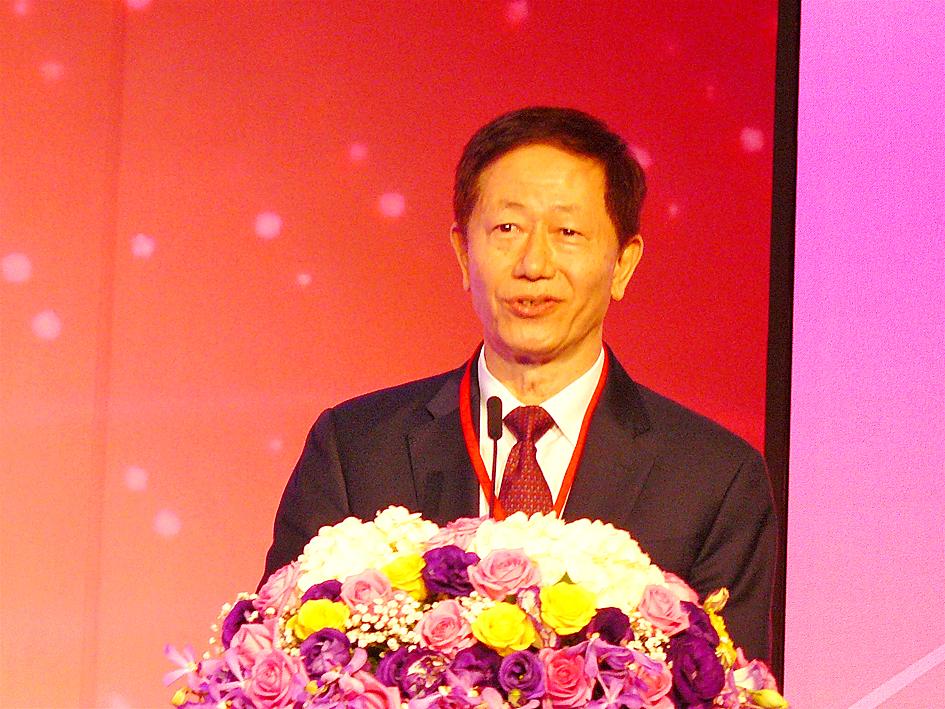The production value of Taiwan’s semiconductor industry is expected to increase 24.7 percent this year and surpass NT$4 trillion (US$143.8 billion) after growing 20.9 percent last year, Taiwan Semiconductor Manufacturing Co (TSMC, 台積電) chairman Mark Liu (劉德音) said yesterday.
Speaking at the online annual meeting of the Taiwan Semiconductor Industry Association (台灣半導體協會), Liu said that Taiwan remained competitive in the global semiconductor industry, despite the impact from the COVID-19 pandemic over the past two years.
The nation continues to be the No. 1 supplier in the semiconductor manufacturing sector and the IC packaging and testing services sector, he said.

Photo: CNA
Taiwan remains the second-largest supplier in the IC design sector, he added.
Liu said he hoped young talent would join the local semiconductor industry to help the industry further progress.
He urged the government to map out a long-term plan for land, water and electricity supply, as well as environmental protection, to facilitate corporate sustainability.
Trade tensions between the US and China are expected to continue to pose challenges for every industry in the world, including the semiconductor industry, Liu said.
The US is pushing for domestic semiconductor manufacturing, with Intel Corp planning to expand its investments in the country.
TSMC founder Morris Chang (張忠謀) on Tuesday said that it would be hard for the US to do this, as it does not have a comprehensive supply chain like Taiwan and its production costs are high.
Separately, cooperation between Taiwan and the US on the semiconductor front can be a basis for advancing a potential bilateral trade agreement (BTA) between the two sides, Minister of Economic Affairs Wang Mei-hua (王美花) said at an online energy forum yesterday.
“A BTA signed on the basis of semiconductor cooperation will have further significance,” Wang said. “It will also strengthen the rules of the game for industrial development, such as intellectual property rights and the protection of commercial secrets.”
Wang said the US-Taiwan cooperation goes beyond chips and there is potential for cooperation in the realms of electric vehicles, 5G and other areas.
Additional reporting by Angelica Oung

RUN IT BACK: A succesful first project working with hyperscalers to design chips encouraged MediaTek to start a second project, aiming to hit stride in 2028 MediaTek Inc (聯發科), the world’s biggest smartphone chip supplier, yesterday said it is engaging a second hyperscaler to help design artificial intelligence (AI) accelerators used in data centers following a similar project expected to generate revenue streams soon. The first AI accelerator project is to bring in US$1 billion revenue next year and several billion US dollars more in 2027, MediaTek chief executive officer Rick Tsai (蔡力行) told a virtual investor conference yesterday. The second AI accelerator project is expected to contribute to revenue beginning in 2028, Tsai said. MediaTek yesterday raised its revenue forecast for the global AI accelerator used

Taiwan Semiconductor Manufacturing Co (TSMC, 台積電) has secured three construction permits for its plan to build a state-of-the-art A14 wafer fab in Taichung, and is likely to start construction soon, the Central Taiwan Science Park Bureau said yesterday. Speaking with CNA, Wang Chun-chieh (王俊傑), deputy director general of the science park bureau, said the world’s largest contract chipmaker has received three construction permits — one to build a fab to roll out sophisticated chips, another to build a central utility plant to provide water and electricity for the facility and the other to build three office buildings. With the three permits, TSMC

TEMPORARY TRUCE: China has made concessions to ease rare earth trade controls, among others, while Washington holds fire on a 100% tariff on all Chinese goods China is effectively suspending implementation of additional export controls on rare earth metals and terminating investigations targeting US companies in the semiconductor supply chain, the White House announced. The White House on Saturday issued a fact sheet outlining some details of the trade pact agreed to earlier in the week by US President Donald Trump and Chinese President Xi Jinping (習近平) that aimed to ease tensions between the world’s two largest economies. Under the deal, China is to issue general licenses valid for exports of rare earths, gallium, germanium, antimony and graphite “for the benefit of US end users and their suppliers

Dutch chipmaker Nexperia BV’s China unit yesterday said that it had established sufficient inventories of finished goods and works-in-progress, and that its supply chain remained secure and stable after its parent halted wafer supplies. The Dutch company suspended supplies of wafers to its Chinese assembly plant a week ago, calling it “a direct consequence of the local management’s recent failure to comply with the agreed contractual payment terms,” Reuters reported on Friday last week. Its China unit called Nexperia’s suspension “unilateral” and “extremely irresponsible,” adding that the Dutch parent’s claim about contractual payment was “misleading and highly deceptive,” according to a statement